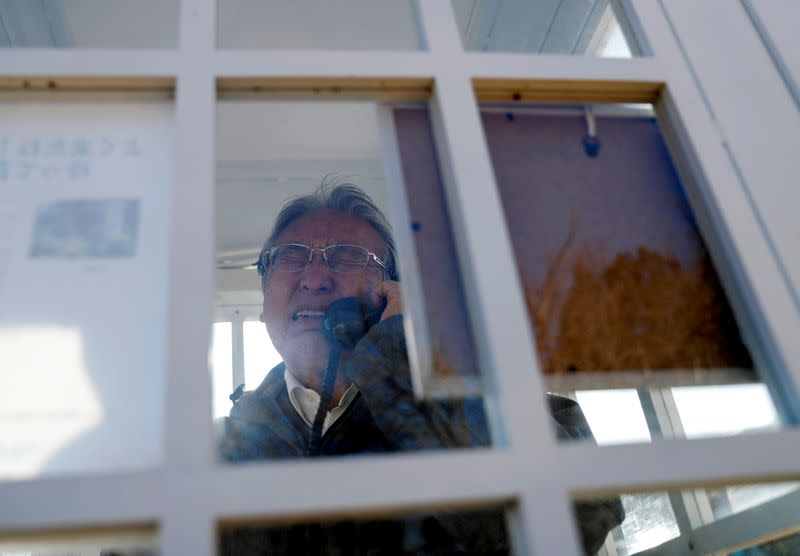By Mari Saito
OTSUCHI, Japan (Reuters) – In a garden on a hill, under the wide branches of a cherry tree, a white telephone booth shines in early spring.
Inside, Kazuyoshi Sasaki carefully dials his deceased wife, Miwako’s cell phone number, bends his large frame and holds the handbag.
He explains how he searched for her for days after the devastating earthquake and tsunami a decade ago, while visiting evacuation centers and temporary mortuaries and returning at night to the rubble of their home.
“It all happened in an instant, I can not forget it now,” he says crying. “I sent you a message where you were, but you did not check it.”
“When I came back to the house and looked up at the sky, there were thousands of stars, it was like looking at a jewelry box,” the 67-year-old said. “I cried and cried and then knew that so many people must have died.”
Sasaki’s wife was one of nearly 20,000 people in northeastern Japan who died in the March 11, 2011 disaster.
According to many survivors, the telephone line in the city of Otsuchi helps them to keep in touch with their loved ones and gives them comfort while struggling with their grief.
I AM LONELY
Earlier in the day, Sachiko Okawa called Toichiro, her late husband, with whom she had been married for 44 years. She asks him what he has been doing with his days since he was swept away by the tsunami a decade ago.
“I’m lonely,” she finally says, cracking her voice, asking Toichiro to watch over their family. “Until now, I’ll be back soon.”
Okawa says she sometimes feels she can hear Toichiro on the other end of the line.
“It makes me feel a little better.”
The 76-year-old, who learned from friends from the hill garden, regularly brings her two grandsons here so they can talk to their grandfather as well.
“Grandpa, it’s been ten years now and I’m going to be in high school soon,” says Daina, Okawa’s 12-year-old grandson, as they all push into the phone box. ‘There’s this new virus that kills a lot of people and that’s why we wear masks. But we are all doing well. ‘
TELEPHONE OF THE WIND
The telephone booth was built by Itaru Sasaki, a few months before the disaster in Otsuchi, a city about 500 km northeast of Tokyo, after he lost his cousin to cancer.
“There are a lot of people who could not say goodbye,” he says. “There are families who wish they could say something at the end, if they knew they would not be able to speak again.”
The phone now attracts thousands of visitors from all over Japan. It is used not only by tsunami survivors but also by people who have lost family members due to illness and suicide. It is called ‘the phone of the wind’, and recently inspired a movie.
A few months ago, Sasaki said he was approached by organizers who want to set up similar phones in Britain and Poland that allow people to call family members they lost in the coronavirus pandemic.
“Just like a disaster, the pandemic came suddenly and when death is sudden, the sadness that a family experiences is also much greater,” the 76-year-old said.
I’m so glad we met
Like thousands of others in devastated coastal communities, councilor Kazuyoshi Sasaki loses not only his wife but many other family members and friends in the disaster.
He has known and loved Miwako most of his life.
He only confessed his love to her when they were both in high school, an offer she immediately turned down. It took another ten years before the two started dating. Eventually they got married and had four children.
Sasaki explains to his wife that he recently moved out of temporary housing and that their youngest son is now building a new home where he can live with their grandchildren.
Before Sasaki told Miwako, he had recently lost weight.
“I will take care of myself,” he promised her as a strong wind blew outside. “I’m so glad we met, thank you, we’re doing all we can, talk fast.”
(Reporting by Mari Saito and Issei Kato; Editing by Pravin Char)
